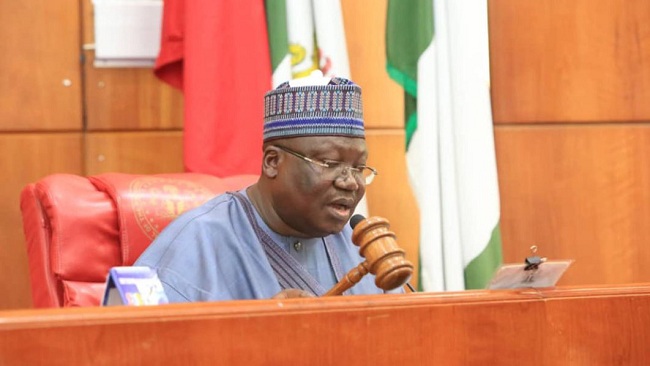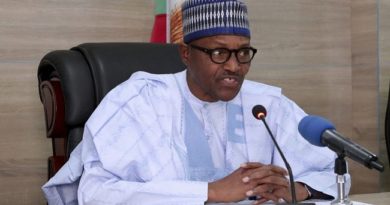Pandemonium As Senate Approves Buhari’s $22.7b Loan Request
It was a rancorous session yesterday in the Senate as the lawmakers engaged in heated arguments on the $29.96 billion loan request made by President Muhammadu Buhari for infrastructural development.
Although approval of $22.7billion was eventually given to the request, the unity among the senators was weakened.
It was a straight disagreement between those opposed to automatic approval of the loan and those who wanted a thorough debate on every item of the request.
Senate President Ahmad Lawan, the Minority Leader, Eyinaya Abaribe, and the Majority Leader, Abdullahi Yahaya were locked in very bitter altercations regarding the procedure to be adopted.
It was learnt that at the closed-door session, the debate took party coloration. And when the door was opened, the leadership of the minority, including Abaribe, was conspicuously absent. It was later learnt that they left the chamber at the end of the closed-door session.
The contentious issue was that while Lawan preferred that the matter be treated by voting according to the recommendations in the report by the Committee on Local and Foreign Debts, many senators wanted all issues raised in the loan request considered and debated in detail to allow Nigerians the opportunity to know why the loan was being approved.
The Chairman of the committee, Clifford Ordia (PDP, Edo), read out the report which recommended that the Senate approve the request.
The Senate had commenced deliberations on the external borrowing as requested by President Buhari when Adamu Aliero came under Order 43 to say the report was big and voluminous and, therefore, it would not be fair for the chamber to just receive it and act on it without studying it.
He said: “This is something to do with a foreign loan to the tune of $29billion. I, therefore, strongly suggest that you allow us to go through this report this week.
“By then, we will be in an informed position to treat it and do justice to it whereby Nigerians would know that we are serious in dealing with the weighty issue.”
But Lawan appealed to his colleagues for the report to be debated, saying the media would feast on it if they allow it to be put off till next Tuesday when the report would have leaked to the press.
“If we are going to postpone the deliberation of the report, we have to keep the document out of the press, otherwise, the media will discuss it before the Senate discusses it and we would lose relevance.
“I believe that we have to weigh it whether we are prepared to delay it, but I agree with your point. The only consolation I have from where I sit is that we have a committee that helped us in putting these things together.
“I believe that we trust our committee on what they have done. I want to believe that where we have issues, we can raise the issues. But the risk we have is that if we don’t consider it, this thing will just go out and it will be out of our hands.”
Later, the Majority Leader, Abdulahi Yahaya, also suggested that the report be considered part by part to avail the senators full knowledge of every line item and details of the bill.
When the stalemate became obvious, Gabriel Suswan asked Lawan to allow the Senate to go into an executive session because he was privy to a report on power that he could not divulge on the floor.
Again, Lawan insisted that the consideration would be done as a whole and a voice vote would be put for senators to vote.
Hence, the decision to discuss behind closed doors was preceded by back and forth arguments between the other lawmakers and Lawan which lasted for over half an hour.
The Senate president insisted that they had reached a point of no return, but later succumbed to pressure as the chamber went into a prolonged closed-door session.
After minutes of silence and consultations, Yahaya moved that the Senate go into a closed-door session for further deliberations. It was adopted.
When the lawmakers resumed, they seemed to have got their acts together as they approved the $22.7billion loan request.
Aliero, who also spoke on the lopsidedness of the projects covered by the loan, asked whether Nigeria was borrowing the money to construct the roads from Lagos to Abidjan.
“Are we so generous to consider this up to Abidjan? Secondly, the East-West road is a very good project and I support fully the inclusion of this project in the borrowing plan.
“If you look at other parts of the country, nothing is said about the North East. The application of this loan is lopsided and I want to say that other geo-political zones should also be considered.
“We have dilapidated roads all over the country. I don’t see why a huge amount of money like this will be concentrated in only one section of the country. When we come to the clause, we should include critical parts that should be covered on this loan.”
Lawan interjected, saying they were not doing a second reading on the report.
“We have recommendations which we will vote on, but before we reach that stage, what is here is what is to finance our capital budget and, therefore, it is important we are conscious that we need the capital aspect of the budget funding.
Again Abaribe came up saying he disagreed with the senate president on the aspect that the loan is part of the capital budget.
“That is not the position. The position is that we would now approve some of these. It is when we get to the point of looking at each of them that we will determine which of these projects will help in growing our economy. You have said we will take it to line by line.”
Lawan, however, denied saying so.
“I said we are going to vote on the recommendations. And the minority leader, you have been long enough in this Senate to know that there is nothing like line by line for this kind of report. It is normally the recommendations of the committee that are voted on.”
Abaribe admitted that he might have misspoken if he had said line by line.
“I am saying each recommendation, because I have some reservations.”
Lawan said there was no way they could leave the Senate’s procedure and do things differently.
“When we vote, you can vote against everything you don’t want or you can amend. Let me make this point very clear, this is a request and what I said is, this is to fund our capital budget, it means the capital budget is weighty.
“Until we pass, there will be no implementation of the capital budget, so it is a choice. If we want, we pass, if we don’t want, we don’t pass. We are going to make it tight spending this money.”
Abaribe ended his contribution by saying: “I just want to end with a very apt saying which I think the whole world knows: ‘who goes a-borrowing, goes a-sorrowing.’”
He said the problem had been that the National Assembly and the Executive had not been tracking the utilisation of the loans to make sure they are invested in the right places where revenue can accrue to the large economy to pay off the debts and increase the revenue that come from investments.
Albert Bassey said if they had to go by just the recommendations, they might not be properly guided.
“If you look at the context, we must also approve and ensure that whatever we approve will be implemented. If you look at it from recommendation 1, it is N17billion from China Exim. Is it possible with the coronavirus?”
Lawan interjected, thanking him for reminding the chamber of coronavirus from China.
Abaribe, again, came under Order 43, but Lawan said he would not allow him because the matter was not discussed with him earlier.
Coming under Order 14 again, Abaribe said privileges were the rights enjoyed by Senate collectively and by members of the Senate individually conferred by the Legislative Houses, Powers and Privileges Act.
The altercation between Lawan and Abaribe became more heated as the Senate president asked which privilege of his was not given to him.
Abaribe said: “I was calling for point of order to explain this thing to you.”
But Lawan said: “Haven’t I given you the chance now? You raised a point of Order 43, you didn’t tell me what you were going to raise, I denied you and that is what the standing order says.
“You are supposed to tell me details, you didn’t even tell me a synopsis. Before then you spoke even more than once.
“Minority leader you know the process, more than everyone here. You have not been denied your privilege. The minority has had more than a fair share in this respect.”
“The Senate leader says that is what he wants also. Now we want to make our input, we are being told, either pass or not pass, and I think that is not very good for the economy of this country.”
Again, Lawan interjected, saying: “I don’t want the discussion of this loan to degenerate into partisanship. This is for our country.”
And responding, the minority leader said: “You are putting us in a very impossible situation because you are telling us to pass even those things that you don’t approve of. This is also about Nigeria.
“This is not about partisanship. Actually if we are going to talk about partisanship, some of us have complained that this is lopsided and we didn’t want to make an issue of it.
“I want us to ask if we should take this issue item by item because we cannot just wholesomely pass everything that comes. If we have to do that, we don’t need to sit here and debate anything.”
The Senate president then explained that there was nothing like trying to separate something. “I don’t even believe in that, to accuse me of separating the minority. You are behaving like the majority, everyone is just listening to you.”
Buhari had on November 28, forwarded a request to the Senate to reconsider and approve the Federal Government’s 2016 to 2018 external borrowing plan.
The loan, he said, was to execute key infrastructural projects across the country between 2016 and 2018.
The president had sent the same request to the eighth Senate under Bukola Saraki in 2016. He had requested about $30 billion.
In his recent letter, Buhari explained that the external borrowing plan targets projects that cut across all sectors with special emphasis on infrastructure, agriculture, health, education, water supply, growth and employment generation.
A former senator, Shehu Sani, had explained that the eighth Senate rejected the loan request to save Nigeria from sinking into the dark gully of a perpetual debt trap.
In its reaction, the Peoples Democratic Party (PDP) berated the All Progressives Congress (APC) senators for approving a fresh $22.7 billion loan, which it said had been rejected by Nigerians across the board.
The party said: “In approving more financial burden on our nation, the APC senators have further shown that their party does not have the interest of Nigerians at heart, but is only out to repress and plunge our citizens into more hardship just for their selfish gains.”
The PDP, in a statement by its National Publicity Secretary, Kola Ologbondiyan, said it was distressing that the APC senators approved the loan, even when the Buhari presidency had not justified the request; a situation the party noted “validates apprehensions that the APC senators have become rubber stamp legislators.”
The Human Rights Writers Association of Nigeria (HURIWA) described as unconstitutional the decision of the Lawan-led Senate to approve request to borrow $22.7 billion despite objection from some senators.
The rights group believes that the collection of the foreign loans which would inevitably be re-looted by government officials offends several provisions of the Nigerian constitution including sections 16(1); (2) which opposes excessive borrowings that make Nigeria a slave of external jurisdictions and impedes our national drive for self-reliance.
In a statement, HURIWA submitted that “the constant flying around cap in hand by Buhari to borrow from all conceivable creditors from all around the world is tantamount to converting Nigeria to a beggarly economy which is against these constitutional provisions.”
The Lagos Chamber of Commerce and Industry (LCCI) and Manufacturers Association of Nigeria (MAN) expressed concerns about the Federal Government’s capacity to service debt.
According to the members of the Organised Private Sector (OPS), the growing national debt is a cause for concern as the profile has grown from N12.6 trillion in 2015 to N26.2 trillion in 2019 third quarter, an increase of 108%.
With oil prices trading below the 2020 budget benchmark, they noted that in the 2020 budget, debt service commitment and recurrent spending were beginning to crowd out capital expenditure, adding that the trajectory was not consistent with the country’s national aspiration to build infrastructure and a competitive economy.
“An additional $22.7 billion borrowing would bring the total debt stock to $108 billion. although 15 per cent of these are debts owed by the state governments.
“ The capacity to service the current stock of debt raises serious sustainability concerns. For instance, the debt service provision in the 2019 budget was a whopping N2 trillion whereas the total capital budget was N2.9 trillion. This implies that the debt service commitment was 70 per cent of capital budget allocation. Debt to revenue ratio was about 30 per cent, which is also on the high side. In the 2020 budget, the total revenue could barely cover debt service commitment and recurrent spending.
“The opportunity cost of high debt service commitment for the economy and citizens is very high. There is also the exchange rate risk inherent in the exposure to mounting foreign debt which we need to worry about. As the currency depreciates, the burden of servicing foreign debt would intensify. This is a major problem with increasing the stock of foreign debt.”
According to him, the rising debt profile of Nigeria continues to be a cause for concern, especially the capacity of government to effectively service it and at the same time meet the bursting needs and aspiration of the citizenry.
Chief Goddy Uwazurike, former president of Aka Ikenga and a lawyer, said: “It is unfortunate that the Senate has approved this loan request. The curious thing there is that there is no clear-cut description of what the loan will be used for! We have a Senate that refused to scrutinise the loan request. The Senate ought to have ascertained our actual debt profile, our repayment plan and, of course, where the loan will be utilised. Hitherto, our loan has ballooned in such a way that generations yet unborn will be hamstrung with a crippling loan burden.”
Also yesterday, the Niger Delta Development Commission (NDDC) budget of N346,388,900,000.00 for the 2019 fiscal year yesterday got Senate approval after some back and forth that characterised the approval.
The approval came following an intensive debate between senators who were divided over the passage of the commission’s budget.
The Chairman of the Committee on NDDC, Peter Nwaoboshi, in his presentation, gave a breakdown of the budget, saying N22,338,190,000 is for personnel expenditure; N13,466,810,000 for overheads; N4,083,000,000 for internal capital expenditure and N306,500,900,000 for development projects.




